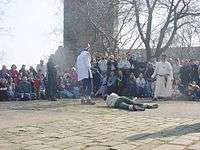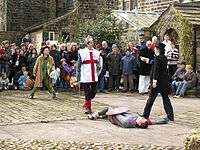Pace Egg play


The Pace Egg Plays are an Easter tradition in rural English culture (the name is attested 1610, pace "Easter" being derived from Latin pascha (c.f. the adjective paschal). The tradition was once widespread throughout England, but is now only practiced in a few areas, particularly Lancashire and West Yorkshire.
The Pace Egg Plays are traditional village plays in the tradition of the medieval mystery plays in which the figure of St George smites all challengers, and the fool, Toss Pot, rejoices. The drama takes the form of mock combat between the hero and villain, in which the hero is killed and brought back to life, often by a quack doctor.
Many Pace Egg plays died out after the Great War, when many of the men who took part in them were killed in action. In Middleton, North Manchester, Pace Egging (performing the Pace Egg Play) was revived in 1967. The Bury Pace Eggers were revived in 1970, and still perform in pubs and squares around the town and surrounding villages on the weekend before Easter.[1]
The plays have also enjoyed a remarkable renaissance in Heptonstall, West Yorkshire in recent decades. The origins are uncertain, but some version of the plays have undoubtedly been performed over many hundreds of years. It has become an established Good Friday tradition, and hundreds come to Weavers Square to watch. A 2015 video by local film-maker Paul Cooke explains the show's origins. In the play St George takes on contenders such as Bold Slasher, the Black Prince of Paradine and Hector.
See also
References
- ↑ "Bury Times, 3 April, 2009". Retrieved 28 February 2011.
- Cass, E. The Pace-Egg Plays of the Calder Valley, London: FLS Books, 2004.
- Cass, E. The Lancashire Pace-Egg Play, A Social History, London: FLS Books, 2001.
- Jennings, B. Pennine Valley: History of Upper Calderdale Dalesman Publishing Co Ltd, 1992.
External links
- Calderdale Council: The pace egg play
- The Rochdale Observer 1909:The Pace Egg and its origin No such article found on this page October 28, 2012
- Digital Tradition: The pace-egging song
- Heptonstall Pace Egg 2015, with explanations of the play's origins by the pace-eggers